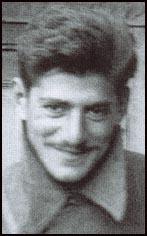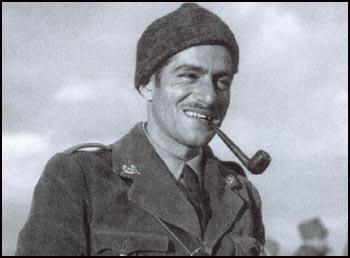Milton Woolf

Milton Woolf was born in New York City in 1915. During the Great Depression Woolf joined the Civilian Conservation Corps. His experiences of the gap between rich and poor "disillusioned and abused and enlightened" him. On returning to Brooklyn he joined the Young Communist League.
On the outbreak of the Spanish Civil War, Woolf joined the International Brigades, a group of volunteers willing to defend the Popular Front government against the Nationalist Army .
Woolf arrived in Spain in March 1937. As he was a pacifist he initially wanted to be a medic but was later persuaded to become a machine-gunner with the George Washington Battalion. He fought in the battles at Brunete, Belchite and Teruel.
The American forces suffered heavy casualties in the war. In March 1938 the Lincoln-Washington Battalion lost two of its most senior officers, Robert Merriman and David Doran, when they were killed at Gandesa on the Aragón front. Wolff now assumed command of the battalion and John Gates became battalion commissar. Woolf led his forces at the great offensive across the River Ebro on the 25th July 1938. The men then moved forward towards Corbera and Gandesa.
On 26th July the Republican Army attempted to capture Hill 481, a key position at Gandesa. Hill 481 was well protected with barbed wire, trenches and bunkers. The Republicans suffered heavy casualties and after six days was forced to retreat to Hill 666 on the Sierra Pandols. It successfully defended the hill from a Nationalist offensive in September but once again large numbers were killed.
The head of the Republican government, Juan Negrin, announced on 21st September that the International Brigades would be unilaterally withdrawn from Spain. That night the Lincoln-Washington Battalion moved back across the River Ebro and began their journey out of the country.

In the Second World War Woolf joined the United States Army and served in Italy and Burma. General William Donovan recruited him into the Office of Strategic Services, and served with the "British Special Services after the fall of Paris and the Nazi invasion of Yugoslavia." He told Studs Terkel: "I don't ever want to see another bloody war again. There's a certain amount of glamour attached to a guy like me because I was a warrior. But I've always had more respect for the conscientious objectors. We were in good wars, that's what we should be honored for, but not because we were warriors."
On his return to the United States he became involved in the civil rights movement. His friend, Alvah Bessie, pointed out: "Wolff himself served as National Commander of the Veterans for many years after the war, working also with the Civil Rights Congress and every committee set up to aid Spanish refugees or political prisoners. He was the sparkplug of VALB's campaign to keep fascist Spain out of the United Nations during 1946-48, and he was involved in the Willie McGee case in Jackson, Mississippi, touring the south before the Freedom Marchers were organized, helping save the lives of the Martinsville Seven and raising $2,000,000 in bail money for Smith Act victims and helping to save the XVth Brigade's commissar Steve Nelson from literal death in a Pittsburgh dungeon."
Wolfe wrote three autobiographical novels: Another Hill, A Member of the Working Class and The Premature Antifascist.
Milton Woolf died of heart failure in Berkeley, Northern California, on 14th January 2008.
Primary Sources
(1) Milton Woolf, interviewed by John Dolland about getting to the International Brigades training camp at Albacete (June 1942)
Most of the guys were like me, just city slickers. We were dressed in fancy shoes, in fancy clothes, and looked like anything but a mountain-climbing expedition. It was very, very grueling, going up and up, and always thinking we were reaching the top and never getting there. When we arrived, weary as we were we cheered and yelled at the top of our lungs."
(2) Milton Woolf, interviewed by Judy Montell in 1991.
Spain was only one battle. World War II was only one battle, what's going on in Central America, South Africa, the Middle East now is another battle, and we're into these things. Struggle is the elixir of life, the tonic of life. I mean, if you're not struggling, your dead.
(3) Alvah Bessie, The Spanish Civil War (1975)
Milton Wolff was the last commander of the Abraham Lincoln Battalion, a major at the age of 23. He had impressed a number of U.S. military men, stateside politicians and foreign correspondents by his natural-born qualities of military leadership, his achievements and his obvious potential. They tried to get him an appointment to West Point and/or a commission and failed, but with the aid of General William (Wild Bill) Donovan, head of the Office of Strategic Services, they managed to place Wolff with British Special Services after the fall of Paris and the Nazi invasion of Yugoslavia.
He served as a civilian with Major equivalency recruiting "proved" antifascists (International Brigade veterans) for behind-the-lines work in occupied Europe. After Pearl Harbor he was transferred (in rank) to OSS and recruited Lincoln men for the same type of work: men like Irving Goff, Vincent Losowski, Bill Aalto and Mike Jiminez, three of whom had been among the handful of American guerrilleros in Spain.
When he discovered that OSS was also recruiting the ragtags of European royalty, nationalists, actual neo-fascists and other off-scourings of alleged "resistance" groups, he quit the outfit in disgust and enlisted in the Army of the United States as a private.
He was then held at Camps Dix and Wheeler with men suspected of disloyalty: German and Italian nationals, pimps and criminals. He protested and was ultimately co-opted for OCS-and thrown out eight weeks later, like others of similar background. He then launched-a long fight to get into action and was assigned in swift succession to Chemical Warfare, Alaskan Replacement, Puget Sound Patrol (watching for invading Japanese submarines) and to a longshore battalion in North Africa.
In desperation he appealed to Donovan but was shifted to longshore work in India, missing a plane the General had sent for him. He had risen in rank, by this time, to corporal, sergeant and second lieutenant. In India he managed to hook up with General (Vinegar Joe) Stilwell as liaison officer with the Chinese engaged in long-range penetration into Burma, and came down with malaria. It was there that Donovan finally caught up with him and had him flown to Italy where Goff, Losowski and his other comrades had met the General and said they needed him.
Frozen in rank for the rest of the war, Wolff and his comrades successfully dropped men, money, munitions and propaganda behind the lines in Austria, Yugoslavia and Greece, as well as in Italy. He went on one mission behind the Nazi lines in northern Italy and all the men-except for Wolff and the guide-were captured. When the defeat of Germany was imminent, he attempted to get help for the Spanish Maquis who were all set to march from the Haute-Savoie to the Pyrenees in an attempt to liberate Spain. This operation was said to have been approved not only by Donovan but by Franklin Roosevelt, but it was overruled by Eisenhower at the insistence of Churchill. Wolff was rushed out of Europe and shipped home.
(4) Studs Terkel interviewed Milton Woolf about his experiences during the Second World War for his book, The Good War (1985)
I left OSS and volunteered for the infantry. I was a machine-gunner in the Spanish War, so I knew my trajectories, my cones of fire, everything like that. I enlisted in June 1942, and I did not fire a shot in anger until the end of 1943. The U.S. Army just did not want me to go to the front. Me and a lot of other Spanish reds.
World War Two, besides giving me the GI Bill of Rights, certainly did not make life easier for me or for the other guys who had fought in Spain. We were still stigmatized as premature anti-fascists. We were harassed by the FBI, Dies Committee, McCarthy Committee. The Subversive Activities Control Board took a year out of my life, defending the Lincoln Battalion before those characters.
I don't ever want to see another bloody war again. There's a certain amount of glamour attached to a guy like me because I was a warrior. But I've always had more respect for the conscientious objectors. We were in good wars, that's what we should be honored for, but not because we were warriors.
I went to Berlin in 1960.1 stood in one of those mausoleums Speer built. It was partially shattered and burnt out. People have defecated and peed in it. I stood in the middle of what was once a magnificent hall. And I felt good. I was glad I was part of this. Because I remember Guernica and I remember Madrid and I remember Barcelona and all that. I felt good standing in that hall, that these sons of bitches got it.
(5) Alvah Bessie, The Spanish Civil War (1975)
Wolff himself served as National Commander of the Veterans for many years after the war, working also with the Civil Rights Congress and every committee set up to aid Spanish refugees or political prisoners. He was the sparkplug of VALB's campaign to keep fascist Spain out of the United Nations during 1946-48, and he was involved in the Willie McGee case in Jackson, Mississippi, touring the south before the Freedom Marchers were organized, helping save the lives of the Martinsville Seven and raising $2,000,000 in bail money for Smith Act victims and helping to save the XVth Brigade's commissar Steve Nelson from literal death in a Pittsburgh dungeon. Nelson was held under a Pennsylvania "sedition" act frame-up and had been sentenced to 20 years by a judge who was an outspoken admirer of Benito Mussolini.
But the attack on the veterans surfaced again in 1953 when a governmental agency, created to forward the Cold War at home and which was the brainchild of the late Senator Pat McCarran (decorated by Franco for his sterling aid to the dictator) started to hear charges against VALB that had been voiced before.
This was the Subversive Activities Control Board, a creature of the McCarran Act that was passed over President Harry Truman's veto in 1950. The allegation-advanced by six deserters from the Brigade and other professional witnesses-was that the Lincoln Battalion and its successor, The Veterans of the Abraham Lincoln Brigade, were subversive organizations probably under the domination of and certainly doing the work of the U.S. Communist Party. This particular fight went on throughout most of 1954 and in 1955 SACB ordered the organization to register as a Communist front, which it promptly refused to do.
Individual veterans were also persecuted under the Smith Act which was allegedly designed to punish-not overt attempts to overthrow the government by force and violence, not teaching and/or advocating the overthrow, but conspiring to teach and advocate . . . . Any lawyer will tell you it is far easier to "prove" conspiracy than it is to prove a man or an organization committed an overt act-when he or it didn't.

